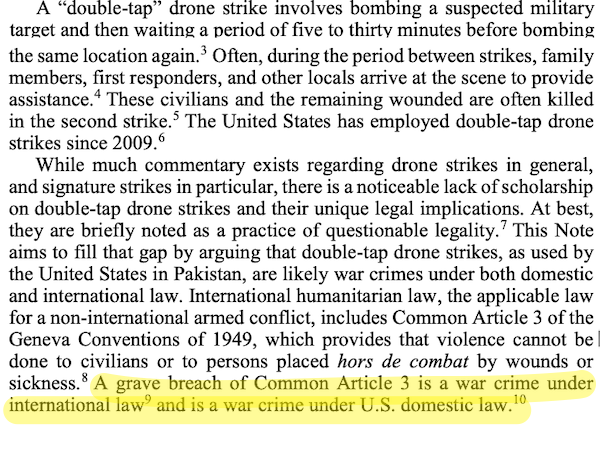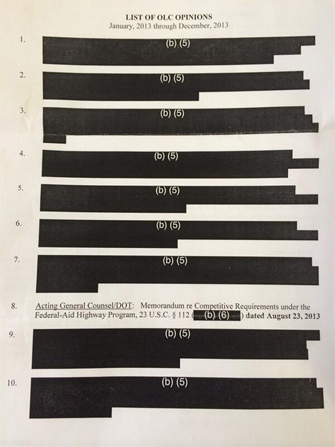Mr Pin smiled humourlessly. “You’ve got stuff on us but, well, between you and me,” he leaned closer, “some of the things we’ve done might be considered, well, tantamount to crimes–“
“All them –ing murders, for a start,” said Mr Tulip, nodding.
“Which, since we are criminals, could be called typical behaviour. Whereas,” Pin went on, “you’re a respectable citizen. Doesn’t look good, respectable citizens getting involved in this sort of thing. People talk.” –Terry Pratchett, The Truth
A brief tour of the collective post-verdict liberalgasm is not notable for tristesse — “Donald Trump needs YOUR HELP to get vengeance on the evil RULE OF LAW,” “Convicted Felon Rambles Through Greatest Hits of Grievances, Falsehoods, and Legal Nonsense” — but one continuing theme does emerge: That the verdict of the jury (upon whom be peace) in Judge Merchan and District Attorney Alvin Bragg’s courtroom is a victory for “the rule of law.” Now, to be fair, Bragg and his merry men did manage to convict a billionaire Presidential candidate of paying off a mistress with with, like, Windows 3.0 accounting software and paper checks (and a theory of the case that should stimulate every record-keeping business entity in New York to do some due diligence on their own internal accounting and any potential frauds MR SUBLIMINAL Or move to Florida). But if we dolly back for a bigger picture even just a little bit, we can see that “rule of law” liberal triumphalism is thoroughly misplaced, and that as we approach the quarter-century mark, the executive branch has been a thoroughly bipartisan criminogenic environment since at least the early 2000s.
In this post, I will expand the scope of “crime or criminal behaviour” (a) to include predicates that, in a dull normal and not a President, would be worth bringing criminal charges, and (b) to include evident violations of international law, whether prosecuted or not (so, below, “QED” means “worth prosecuting,” though I’d add that the criminality is glaringly obvious except to those whose salaries depends obfuscation.
A usage comes example from Bill Black, who wrote at NC of the Great Crash: “Our financial policies have been so criminogenic for decades that we are suffering recurrent, intensifying financial crises.”(1) Black wrote of accounting control fraud. In this post I will write of torture and warrantless surveillance (Bush), and drone strikes and secret law (Obama). I freely admit I don’t have a master theory of criminality here, but I hope that the accumulation of the colossally grotesque events that follow will persuade you that criminogenic is indeed an accurate characterization of the executive branch in “our democracy.”
A word on Biden, whose offenses as a genocidaire are so obvious as to need no discussion. Taleb remarked, comparing the “innocent” Biden to the convicted Trump:
Dang, what has Hur on about? I forget. Biden left some classified material in his sock drawer? Or was it the unsecured server in his bathroom? Did he sneak some documents out of the National Archives in his pants? Whatever. Onward to the non-trivial historical figures and their long-forgotten and now normalized acts of torture, spying, murder, and Star Chamber antics under secret law.
(If, when the Democrats took control of the House and Senate in 2006, Pelosi had impeached Bush for these crimes, we would be living in a very different timeline.) Let’s look at torture first, and then warrantless surveillance. (Since I had been a political blogger several years at this point — the first story I ever blogged about in near-real time was the ever-shifting rationale for Saddam Hussein’s WMDs — I remember these crimes, and the political battles surrounding them, vividly.)
Here, it is sufficient to quote from the report by Antonio Mario Taguba, who was commissioned to look into the allegations of torture at Abu Ghraib(2)after the story broke in 2003(3):
5. (S) That between October and December 2003, at the Abu Ghraib Confinement Facility (BCCF), numerous incidents of sadistic, blatant, and wanton criminal abuses were inflicted on several detainees. This systemic and illegal abuse of detainees was intentionally perpetrated by several members of the military police guard force (372nd Military Police Company, 320th Military Police Battalion, 800th MP Brigade), in Tier (section) 1-A of the Abu Ghraib Prison (BCCF). The allegations of abuse were substantiated by detailed witness statements (ANNEX 26) and the discovery of extremely graphic photographic evidence. Due to the extremely sensitive nature of these photographs and videos, the ongoing CID investigation, and the potential for the criminal prosecution of several suspects, the photographic evidence is not included in the body of my investigation. The pictures and videos are available from the Criminal Investigative Command and the CTJF-7 prosecution team. In addition to the aforementioned crimes, there were also abuses committed by members of the 325th MI Battalion, 205th MI Brigade, and Joint Interrogation and Debriefing Center (JIDC). Specifically, on 24 November 2003, SPC Luciana Spencer, 205th MI Brigade, sought to degrade a detainee by having him strip and returned to cell naked. (ANNEXES 26 and 53)
6. (S) I find that the intentional abuse of detainees by military police personnel included the following acts:
a. (S) Punching, slapping, and kicking detainees; jumping on their naked feet;
b. (S) Videotaping and photographing naked male and female detainees;
c. (S) Forcibly arranging detainees in various sexually explicit positions for photographing;
d. (S) Forcing detainees to remove their clothing and keeping them naked for several days at a time;
e. (S) Forcing naked male detainees to wear women’s underwear;
f. (S) Forcing groups of male detainees to masturbate themselves while being photographed and videotaped;
g. (S) Arranging naked male detainees in a pile and then jumping on them;
h. (S) Positioning a naked detainee on a MRE Box, with a sandbag on his head, and attaching wires to his fingers, toes, and penis to simulate electric torture;
i. (S) Writing “I am a Rapest” (sic) on the leg of a detainee alleged to have forcibly raped a 15-year old fellow detainee, and then photographing him naked;
j. (S) Placing a dog chain or strap around a naked detainee’s neck and having a female Soldier pose for a picture;
k. (S) A male MP guard having sex with a female detainee;
l. (S) Using military working dogs (without muzzles) to intimidate and frighten detainees, and in at least one case biting and severely injuring a detainee;
m. (S) Taking photographs of dead Iraqi detainees.
George Bush, as President, is commander in chief of the Army under Article II Section 2, so torture at Abu Ghraib is on his desk(4). QED.
Felonious Warrantless Surveillance
From Wikipedia:
NSA warrantless surveillance — also commonly referred to as “warrantless-wiretapping” or “-wiretaps” — was the surveillance of persons within the United States, including U.S. citizens, during the collection of notionally foreign intelligence by the National Security Agency (NSA) as part of the Terrorist Surveillance Program. In late 2001, the NSA was authorized to monitor, without obtaining a FISA warrant, phone calls, Internet activities, text messages and other forms of communication involving any party believed by the NSA to be outside the U.S., even if the other end of the communication lays within the U.S.
From The Week in 2015:
U.S. District Court Judge Anna Diggs Taylor of Detroit struck the latest blow last week, declaring Bush’s warrantless surveillance program a flagrant violation of the Constitution. The White House, Taylor said, defiantly bypassed the special national-security court that Congress established for just this sort of operation. By refusing to submit its telephone and e-mail snooping to court and congressional oversight, she said, Bush has deliberately undermined the checks and balances that are the basis of American democracy….
But even in wartime, the law is the law, said law professor Jonathan Turley in the Chicago Tribune. If other courts uphold this decision, the implications are grave, for it would mean the president of the United States has committed a felony—dozens of them, in fact. That’s why congressional Republicans are frantically trying to give Bush’s spying program ex post facto legitimacy, and shield it from further judicial review.
The entire political class reacted with horror to Diggs’ ruling (ellipted in the quote above). But felonies they were, and Bush committed them (mostly erased from search, interestingly, but I blogged about them at the time). Again, the criminality is QED.
Now let us turn to Barack Obama, so different from his predecessor (hollow laughter).
The Crimes of Barack Obama
Obama rationalized and normalized all of Bush’s crimes; “Obama’s new FBI chief approved Bush’s NSA warrantless wiretapping scheme.” (On torture, Obama decided that “it’s important to look forward and not backwards.” The CIA — one would expect no less — had also “tortured some folks” in Iraq; my speculation is that Obama’s refusal to hold them accountable formed the basis of the alliance between Democrats and spookdom that persists to this day, and was so very useful in 2016–2020). From the New York Review of Books:
Gradually, other points of continuity between the national security policies of Bush’s second term and the Obama administration became evident. Obama revived the military commissions charged with conducting trials of detainees. He continued to classify the struggle against al-Qaeda as a war to be fought under military rules. He also increased drone strikes, maintained the NSA’s secret surveillance programs, and prosecuted whistleblowers with greater zeal than any administration in history.
From Just Security:
In fact, many of the arguments (torture advocate John) Yoo made behind closed doors in 2002 continue to appear in the Obama administration’s briefs defending warrantless surveillance under Section 702 of FISA today. And, in at least one key respect, the Obama administration’s arguments are even broader than the ones that Yoo felt he could justify.
In short, it is the Obama administration’s view that Americans forfeit the core protection of the Fourth Amendment whenever their private communications cross an international border. And, in today’s globally connected world, that is happening more and more.
Now let’s turn to the new crimes committed by Obama, both of which have to do with drones.
Double-Tap Drone Strikes
From the Florida Law Review (2017), “Double-Tap Warfare: Should President Obama Be Investigated for War Crimes?“:

Once again, QED.
Drone Strikes on a Teenage U.S. Citizen
Kevin Drum in Mother Jones, “The American Teen Whose Death-by-Drone Obama Won’t Explain“:
The US targeted killing program is shrouded in secrecy, and the president had never before issued a statement like this about people accidentally killed by US drone strikes. (He did not use the word “drone.”) One such death that stands out is that of Abdulrahman al-Awlaki, a 16-year-old American citizen who was killed in a US drone strike.
Abdulrahman was the son of Anwar al-Awlaki, the radical cleric turned Al Qaeda propagandist. The father was killed in a drone strike that targeted him in Yemen in September 2011. The son was killed weeks later in a separate strike in Yemen. According to his family, the attack was on a restaurant. Attorney General Eric Holder later said that this strike did not “specifically” target the young man.
The US government has never said that Abdulrahman was involved in terrorist activities. In 2012, I asked Obama during a Reddit AMA what he thought about the teen’s death, and the question received hundreds of votes from Redditors, meaning the president and/or his social-media team almost certainly noticed it. Yet Obama didn’t respond.
Now that he’s established the precedent of explaining the killings of US citizens in targeted strikes, Obama and the administration might see fit to say what happened in the case of Abdulrahman. Was his death accidental or is there evidence he was involved with terrorists?
QED once more.
Secret Law
But if you really want to create a criminogenic environement, establish a system of secret law. The dull normals won’t know what to obey and what not to obey! And one of the things that those in the know will know is that they can rewrite the law, in secret, to sanction whatever predicate they want, even retrospectively.
(You could actually see this mentality at work in Merchan’s court, as the Prosecution was allowed to conceal the object offense until the very last moments, denying the Defendant their right to prepare a defense, a violation of the Sixth Amendment(5).) From Human Rights Watch (2013):
Secret legal interpretations by the Justice Department’s Office of Legal Counsel (OLC) and the Foreign Intelligence Surveillance Court allowed the NSA’s surveillance programs to grow in ways that raise serious concerns about what the government is doing in our name and the extent of violations of American’s privacy and civil liberties….
This is not the first time that abuses of power have occurred when a government program operates in a bubble of secrecy with only limited oversight: similarly, Americans were outraged to learn that memos authored by the OLC during the Bush Administration approved interrogation methods that many (like, any normal human being ffs; lawyers) equate to torture…. Making a concrete commitment to the public’s right to legal interpretations on issues including the intelligence community’s surveillance programs and other controversial policies like targeted killing through the use of drones or other means would make this respect part of the administration’s legacy. While the government has an obligation to protect properly and appropriately classified information, democracy does not thrive when our national security programs and the intelligence community’s actions are shrouded in secrecy. The public must, at the very least, have a shared understanding of the bounds and limits of the laws of our land and be able to have an informed debate about our policies.
From the Federation of American Scientists (2013):
DC District Judge Ellen Segal Huvelle yesterday ordered the Obama Administration to release a copy of an unclassified presidential directive, and she said the attempt to withhold it represented an improper exercise of “secret law.”
The Obama White House has a “limitless” view of its authority to withhold presidential communications from the public, she wrote, but that view is wrong.
“The government appears to adopt the cavalier attitude that the President should be permitted to convey orders throughout the Executive Branch without public oversight– to engage in what is in effect governance by ‘secret law’,” Judge Huvelle wrote in her December 17 opinion.
Several significant points emerge from this episode.
First, President Obama’s declared commitment to “creating an unprecedented level of openness in Government” has not been internalized even by the President’s own staff. This latest case of “unbounded” secrecy cannot be blamed on the CIA or an overzealous Justice Department attorney. It is entirely an Obama White House production, based on a White House policy choice.
Second, and relatedly, it has proved to be an error to expect the executive branch to unilaterally impose transparency on itself. To do so is to ignore, or to wish away, the Administration’s own conflicting interests in secrecy and disclosure. Instead, it is the role of the other branches of government to check the executive and to compel appropriate disclosure.
Here is some liberal Democrat bloviation on the danger that the apparatus of secret law they themselves set up could be turned to evil ends if somebody other than a Democrat were elected (Vox; Brennan Center). Naturally, Trump continued Obama’s program of secret law, exactly as Obama continued Bush’s program of warrantless surveillance. From Project on Government Oversight (2017): ”
POGO had requested a listing of (Office of Legal Counsel (OLC)) opinions from January 2014 through March 8, 2017. In response, OLC sent documents listing 24 unclassified opinions. Some of these opinions were public, such as opinions on the Department of Homeland Security’s discretion on enforcement of immigration laws and on the Justice Department’s ability to withhold information from its own Inspector General. Out of those 24, the agency completely redacted the titles of 11 opinions. Even the dates those memos were issued are blacked out.”
Like this:

As Cory Doctorow wrote in 2014, “Lurking inside Obama’s secret drone law: another secret drone law,” secret law can even be recursive (!):
Remember the secret memo explaining the legal justification for assassinating Americans with drones that the ACLU forced the Obama administration to release? Turns out that that memo relies on another secret memo that the Obama administration is also relying on. Obama is a no-fooling Constitutional scholar; you’d think that he’d be wise to the idea that secret law is not law at all.
This kind of thing is all too common, but tremendously problematic. For folks actually trying to understand what the law actually is the fact that people have to play this bizarre game of 20 questions, seeking secret laws and interpretations, only to get breadcrumbs pointing to other secret interpretations of the law is just ridiculous. We’ve complained in the past about the dangers of a secret law, but just the fact that the American public needs to play this stupid game, and the DOJ appears to have broken up the secret interpretations of the law into different sections, making it that much harder to track it all down, raises serious questions about what sort of government we have, and how Americans can be expected to respect, let alone obey, the law when we can’t even be told what it is.
Enough Secret Law: Newly Released DOJ Drone Killing Justification Memo… Points To Another Secret Drone Memo (Mike Masnick/Techdirt)
Conclusion
Alexander Hamilton, in Federalist 70, writes:
is a leading character in the definition of good government. ; it is not less essential to the steady administration of the laws; to the protection of property against those irregular and high-handed combinations which sometimes interrupt the ordinary course of justice; to the security of liberty against the enterprises and assaults of ambition, of faction, and of anarchy
A feeble Executive implies a feeble execution of the government. A feeble execution is but another phrase for a bad execution; and a government ill executed, whatever it may be in theory, must be, in practice, a bad government.
Torture, warrantless surveillance, war crimes, and secret law are, to be sure, energetic; but it’s hard for me to believe that Madison would characterize them as “good government,” “steady administration”, or “the protection of property.” But the Federalist Paper’s great system of checks and balances seems to have failed in the matter of “protection of the community against foreign attacks,” at least insofar as “protection” is construed by the executive branch. I’m not sure why (though it’s worth noting that two powerful actors in our present state of affairs have status only in our unwritten Constitution: political parties and the intelligence community, so called).
Geopolitical realist John Mearsheimer writes, in the Tragedy of Great Power Politics:
The first assumption is that the international system is anarchic, which does not mean that it is chaotic or riven by disorder. It is easy to draw that conclusion, since realism depicts a world characterized by security competition and war. By itself, however, the realist notion of anarchy has nothing to do with conflict; it is an ordering principle, which says that the system comprises independent states that have no central authority above them. Sovereignty, in other words, inheres in states because there is no higher ruling body in the international system. There is no “government over government.”
It’s possible, I suppose, that the anarchic character of the world in which the Executive “protects” “the community” “against foreign attacks” has led to “bringing the war back home” (it’s very hard to believe, for example, that secret law is not now being written for domestic drone strikes, with “foreign influence” being the predicate). Ironic, of course, since avoiding anarchy — a fancy word for that might be “the rules-based international order” or, in the vulgate, Calvinball — is of such concern to Hamilton. If so, I’m not sure what course of action the nation, as a nation, can pursue. A first step might be to stop lying to ourselves about where the rule of law applies, and where it doesn’t. And to whom.
NOTES
(1) Law Insider adds a social control aspect:
Criminogenic means those risk factors which include, but are not limited to criminal personality; antisocial peers, attitudes, values, beliefs; impulsivity; substance abuse and family dysfunction that are identified through research as correlating with offending behavior. Effectively addressing these dynamic factors should lead to decreased delinquency risk and offending behaviors.
How odd that the ability to act with impunity because of proximity to power is not added as a factor.
(2) See the BBC and Democracy Now on Israel’s involvement in Iraqi torture, including training US contractors also involved at Ghraib.
(3) Taguba was, of course, defenestrated by 2007. This New Yorker story predates the rot under Hendryk Hertzberg, and is well worth a read to see the reactions of administrative officials, who are amusingly shocked to meet a naif like Taguba.
(4) It has always been my entirely unevidenced contention that Dick “Dark Side” Cheney, who preferred raw intelligence, had torture sessions at Abu Ghraib streamed to his office.
(5) Caveat that I have to read the transcripts when they become available, to have some certainty about what actually went down. But from all the coverage I’ve seen, this is a colorable claim..








